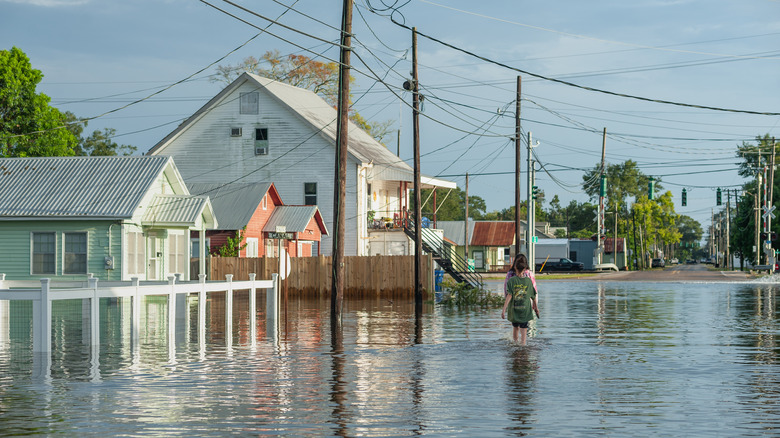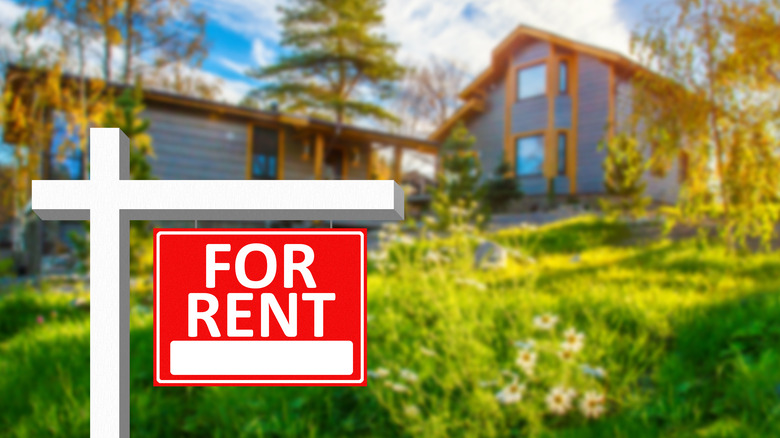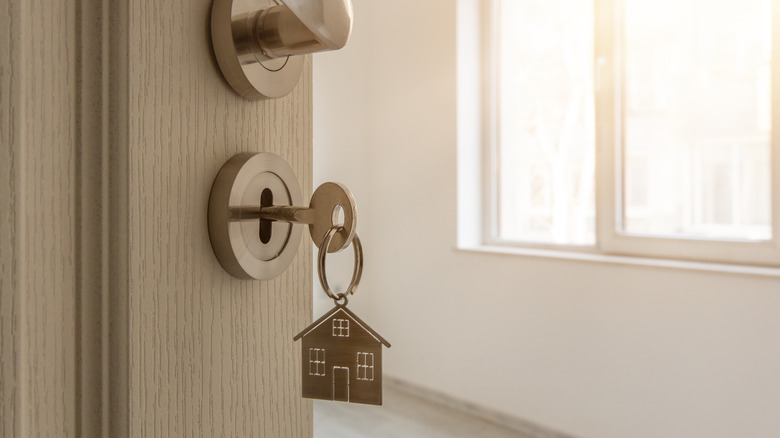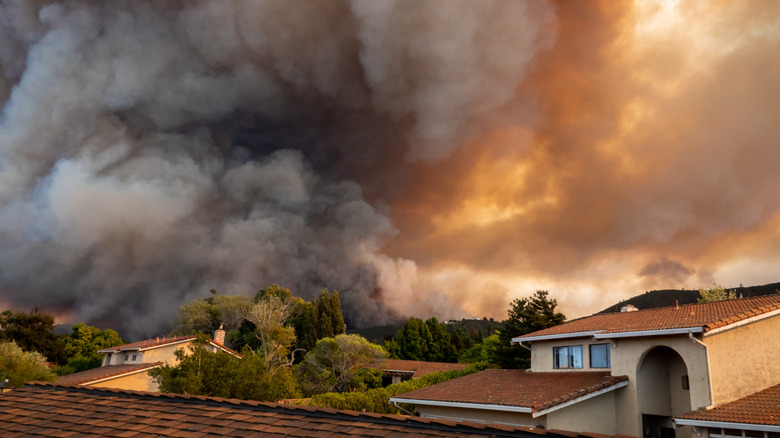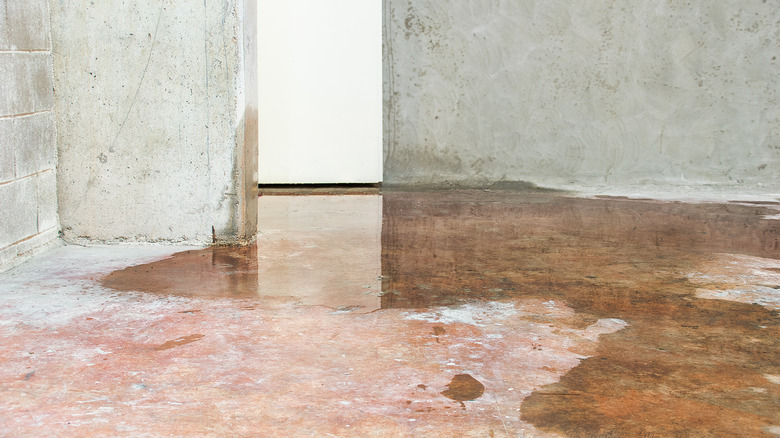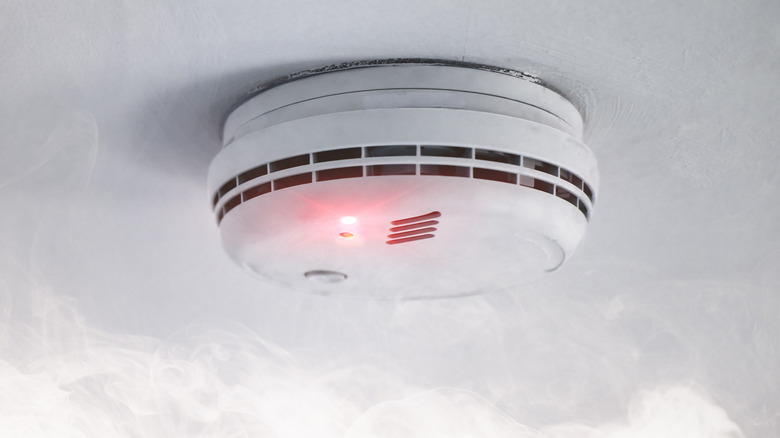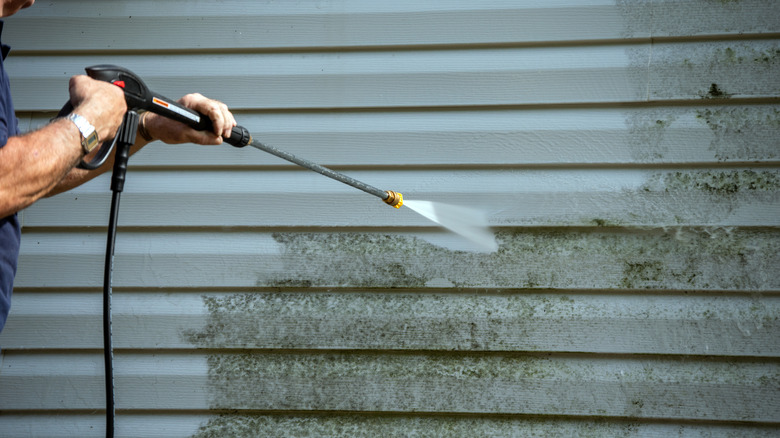Mistakes Everyone Makes When Buying Home Insurance
If you own a home, you'll need to protect it with a good insurance policy. According to Allstate, your homeowner's insurance keeps your property safe from many problems. Your policy can protect against falling trees, electrical fires, and hail. In addition, your backyard gardening shed, your fence, and garage can all be covered. Some policies even cover you for non-property-related things. For example, if you're hosting a party and a guest breaks their arm, you're protected. Or, if your dog mistakes your neighbor for an intruder and bites them ... you're covered.
Homeowner's insurance provides a good umbrella for you, your home, and most belongings inside. In some areas, it's illegal not to have this insurance. However, it's easy to make mistakes when picking a home insurance policy. There are countless details to consider and thousands of policies and companies to choose from. There's hazard insurance, personal liability, and property policies to consider. We don't blame you if you feel a bit upside down! However, you'll come out on top by avoiding these common mistakes.
Neglecting to add flood insurance coverage
One of the most common mistakes homeowners make when taking out an insurance policy is forgetting that most policies require extra flood coverage. For example, after Hurricane Harvey hit southeast Texas hard in August 2017, about 92,000 Texans were able to rebuild their ruined homes because they purchased flood insurance, according to FEMA. However, thousands of other people had to rely on personal savings, unreliable government assistance, and personal charity. These options don't cover the entire cost and can take much longer to procure than filing with your insurance.
Consider paying a little extra each month to add flood insurance to your complete home insurance policy to avoid this frustrating and disheartening process. If you live in an area prone to flooding or your home sits on a low plot of land, it will be money well spent. Even a little bit of water (as much as an inch) can cause thousands of dollars in damage (via Flood Smart). Once the water rises high enough and enters your electrical outlets through low-positioned wall sockets, without flood insurance, you're toast.
Not shopping around for the best price
When choosing a homeowner's insurance policy, do your research to get the best deal. According to U.S. News & World Report, many homeowners don't put any time or effort into finding a home insurance policy that works best for them. Most buyers look at the cost instead of the policy inclusions. They go for the cheapest option instead of the one that best suits their needs. This way of approaching things is one of the biggest mistakes associated with selecting insurance.
Instead, decide what you would like covered in your home, including any extras like flood or renters insurance, and then gather multiple quotes from different companies to compare them directly. Then, throughout the life of your policy, check in to ensure you are still getting the best rates. Just because you purchased a policy doesn't mean you can't change your mind at any point in the future.
Thinking your policy will cover your renters
Do you want to purchase home insurance as a landlord? There are different policy requirements and insurance laws to keep in mind. According to Travelers Insurance, obtaining a good home insurance policy as a landlord is essential. You'll be covered for the entire property when you take one out, even when the home is composed of multiple units or condos. You will need to take out a separate policy for each property you own.
It would be a mistake not to purchase coverage. If someone becomes injured on the property, you might be held responsible for all medical expenses incurred if you don't have the correct insurance. In addition, the landlord's insurance covers things that are yours but remain on-site, such as a garage or garden shed. Your property is protected should your tenants or their guests cause any damage. Not taking out the policy isn't worth facing the risk of accidental damage or injury while uninsured.
Insuring your home's market value, not replacement value
The cost of rebuilding your home if it was destroyed and selling it on the standard real estate market are two completely different numbers. According to Shannon Insurance, the terms to know are market value and replacement value. The market value is determined by a home appraisal, with no upgrades or replacements. On the other hand, the replacement cost is how much it would take to rebuild your home. This amount determines your insurance.
However, keep in mind that the home's replacement cost doesn't include coverage for the entire property. This fact is because you don't need to rebuild the land in case of a disaster. Another thing to keep in mind is that if you do any major renovations or other upgrades to your home, the replacement value would significantly increase. You should get it reassessed and update your policy to reflect the new value.
Forgetting to insure your personal belongings
Are you renting your home? There is also a version of homeowners insurance that is right for you. While your landlord's insurance covers the actual structure, this insurance protects the objects inside even if you don't rent from a private landlord and live in a condo or apartment complex. If there's a robbery, fire, flood, or tornado, it will be a total loss for you, even if the place is technically insured.
According to Lemonade, this type of insurance is often called contents insurance and covers your stuff in an emergency. The basic level of coverage costs around $5 a month, depending on the value of your personal property. However, there are still a few caveats to your coverage. If you have nice, expensive things, like a camera, your grandmother's engagement ring, or a thousand-dollar racing bike, you'll need to take out another policy to ensure these items are safe.
Insuring your mortgage, not your entire home
When you take out home insurance, make sure that you insure the actual cost of your home and not just the size of your mortgage. According to Bankrate, your mortgage company is only concerned with protecting its assets. While you, on the other hand, need to protect your entire home. Let's pretend you have a home that is worth about $400,000. If you put 20% down as a deposit, your mortgage should be around $320,000.
If you were to insure your home for the worth of the mortgage (which is something the mortgage company would be okay with), you're already out $80,000 from the gate if something happens to your house. It might be tempting to do this since insuring $320,000 is less than $400,000. However, if your house burns down, you will get a check for $320,000 and won't see a penny. It will go straight to the bank. Be sure to take out a full policy, even if it is more expensive.
Choosing not to add insurance for sewage leaks
Don't be left in a crappy situation. Be sure your homeowner's policy covers sewage backup. According to Value Penguin, there are a few stipulations for the sewage line running through your property. If the line is damaged suddenly or violently, like an explosion, riot, or fire, the homeowners' insurance policy will cover the costs. The takeaway is that the damage needs to be caused by something you cannot control. It typically cannot be caused by you or someone in your household.
If you want to cover damage caused by a system backup, you'll usually need to purchase an add-on to your current insurance policy or a separate policy (via Coverage). Another thing to remember is that even though a sewage backup might cause flooding, flood insurance will not cover it. Annoying, we know. Certain companies will sell insurance specifically for sewer issues.
Forgetting to let your insurer know about household changes
Your insurance needs may change when you get married, have a child, or adopt a pet. You should update your policy to reflect the new makeup of your household. For example, according to Insurance Hub, when you get married or move in together, you need to take stock of the things your partner is bringing to the home if they join you. You might need to update your policy if they have something expensive, like a priceless artwork or family heirloom. If you move in with them, it's the same, in reverse. If you buy a new home together, you'll need to take out a completely new policy for your new place.
Additionally, the name on the home's deed needs to match the name on the insurance certificate (via Clovered). So, if only one spouse (or partner, if unmarried) has their name on the property's papers, then that person's name should be on all the insurance documents. It should be easy to add your spouse to the insurance if you are married. However, it depends on the insurer if you are unmarried. You will need to contact the company to find out the specifics.
Neglecting to inform your insurer about safety features
If you update your home with additional safety features, you should let your insurance company know. By doing so, you might be able to wrangle lower monthly insurance premiums. According to Safewise, installing a home alarm and video monitoring system makes your home less likely to be the target of a successful break-in. The insurance company might reduce your overall costs by up to 20% because you are now a lower risk to insure.
Several other safety features might help you see a better return on investment (via Insuramatch). These include making sure your house has working smoke and carbon monoxide detectors, a built-in sprinkler system (like you might see at a hotel), secure deadbolts, and even a safe deposit box. If you are unsure about investing in a feature without a clear ROI, you can always call your insurer. Ask them about how the upgrade would impact your monthly pricing before moving forward with your plans.
Choosing not to bundle your home insurance
Over time, you can save a small fortune on insurance by combining your policies into one multipolicy. You'll often hear this practice referred to as bundling in the biz. Choosing not to take advantage of bundling is one of the biggest mistakes you can make when buying home insurance. According to Nerd Wallet, bundling insurance can save you up to 25% off your total costs, compared to purchasing each policy separately. You will save plenty of time over the years since having your insurer be a one-stop shop for all your needs cuts down on phone calls, negotiations, and the overall back-and-forth most folks tend to have with their insurance companies.
Paying a single deductible for multiple policies is another perk of bundling your insurance (via Experian). If you make too many claims against either policy (home, auto, etc.), it's less likely that your insurer will drop you as a client because they will have an overall better and more personal relationship with you.
Forgetting to put together a home inventory
When you know what you own and are in the practice of keeping a detailed list, things won't be as bad when tragedy strikes. While it's a daunting, Herculean task, creating a home inventory makes recovering from a catastrophe easier.
According to Progressive, you can write your inventory down (but make a copy or two!) or store it digitally. Just stick with the method that works best for you from the start. Next, go room by room and make a list of every item of value. Typical items in a bedroom might include your bed frame, the mattress, a grandmother's ring, a television, or a favorite pair of shoes. Once you have totaled everything up, you'll have a better idea of the size of the policy to take out. If you forget everything, it's also a good idea to take a slow-moving video of each room in your home. You can pretend you are showing the place off to potential buyers when you're really just documenting everything's condition and location.
Not using an insurance agent as a resource
Purchasing home insurance without talking to another human being about your situation can often be a pretty big mistake during the buying process. Whether or not you buy your policy through them, brokers can still help you get the best deal. Well, if they work on commission and don't charge brokerage fees, that is, according to Nerd Wallet.
If the broker charges a fee, it's a good idea to speak with them about your specific financial situation. This conversation will help you get tailored advice specific to you and not just rely on what you read on Google. However, if things are pretty straightforward for you, you're better off working with a commission-based broker. You need to be aware of different terminology around roles in the industry (via Ramsey Solutions). A broker is an independent party who works across multiple insurance companies to find you the best deal. However, an insurance agent works for a specific company and can help you get the best deal only within that company.
Thinking your insurance is the same as a warranty
Home warranties and insurance offer different protections. It's essential to understand the distinction between the two before you buy. According to U.S. News & World Report, both entities can work to protect homeowners from risks and other disasters that might occur on their property. However, the main difference is that warranties cover repairs or replacements to a home's systems (like the HVAC system or the roof) or appliances and only apply for a set term. Some warranties might be for one year, some longer. It simply depends on the manufacturer's (or contractor's) guidelines.
However, a home insurance policy offers protection against damages due to unforeseen circumstances, not everyday use. For example, if someone breaks into your home and steals your microwave, your homeowner's insurance policy will pay for a replacement (via HWA Home Warranty). However, if your microwave short circuits, that would be a situation where your warranty would come in handy.
Thinking insurance covers maintenance issues
Here's one last thing to remember when buying your home insurance. Homeowners' insurance policies (and even warranties, for that matter) don't tend to cover things you haven't been maintaining. Drawing on the microwave example, if you don't clean your microwave and it catches on fire one day, neither your homeowner's insurance nor your home warranty will replace it unless you've taken out a policy to cover this type of thing.
According to This Old House, there is a special kind of home insurance called home repair insurance. If you have one of these policies, you don't need to plan for life's unexpected expenses. For example, if your air conditioning breaks in the middle of June or your backyard deck looks worse for the wear, this insurance will keep you covered in a pinch. To consider whether or not you are a good candidate for this kind of insurance, think about whether or not you have the monthly budget to cover another premium. You might prefer to hedge your bets and pay out of pocket for things as they come up (via Value Penguin). The decision depends on the age of your home and the condition of its appliances and systems. If you know these things, you can make a more accurate choice for your specific situation.

